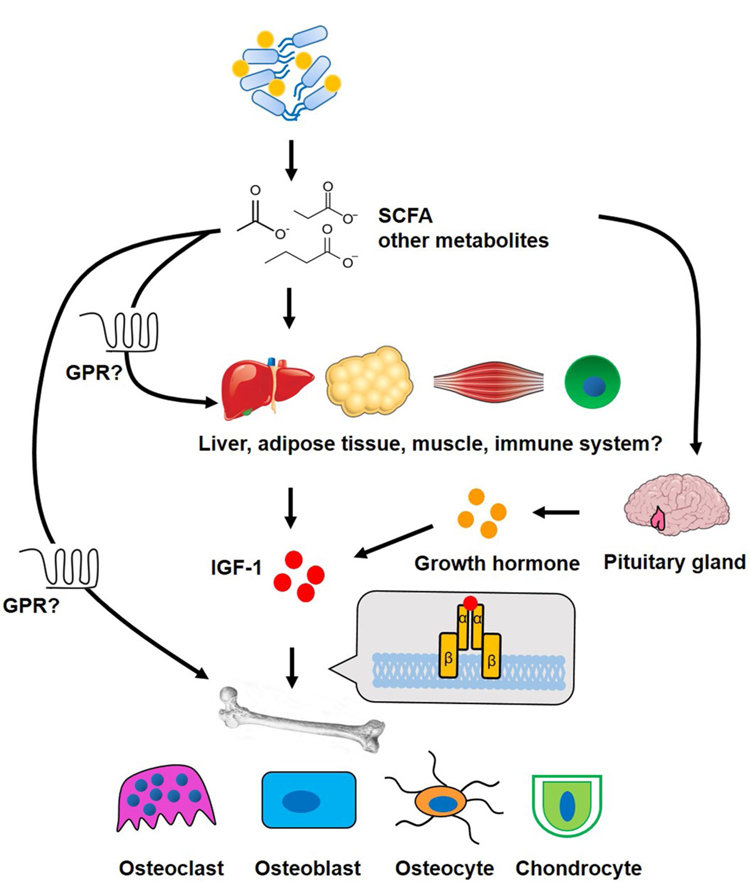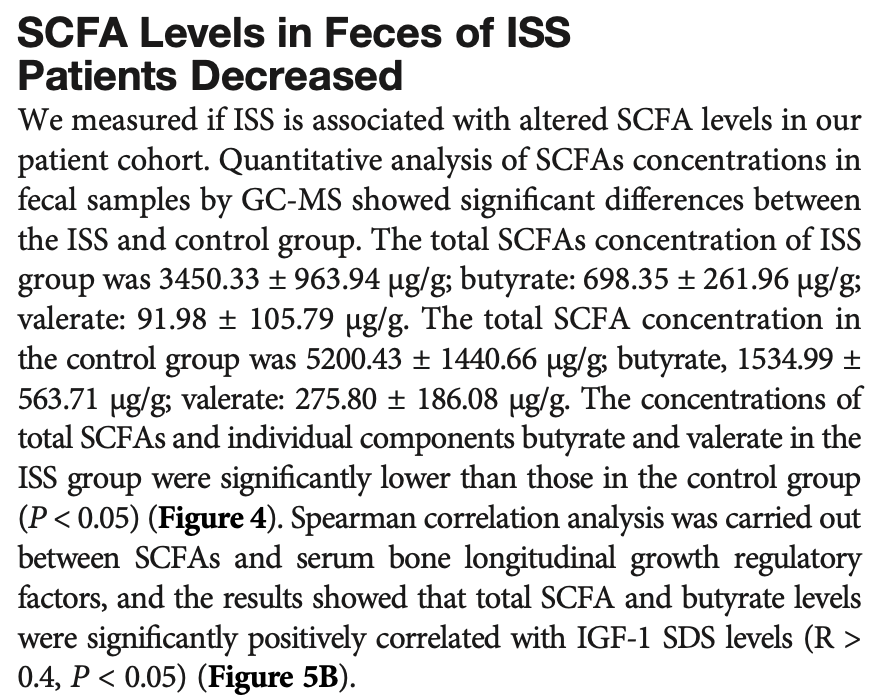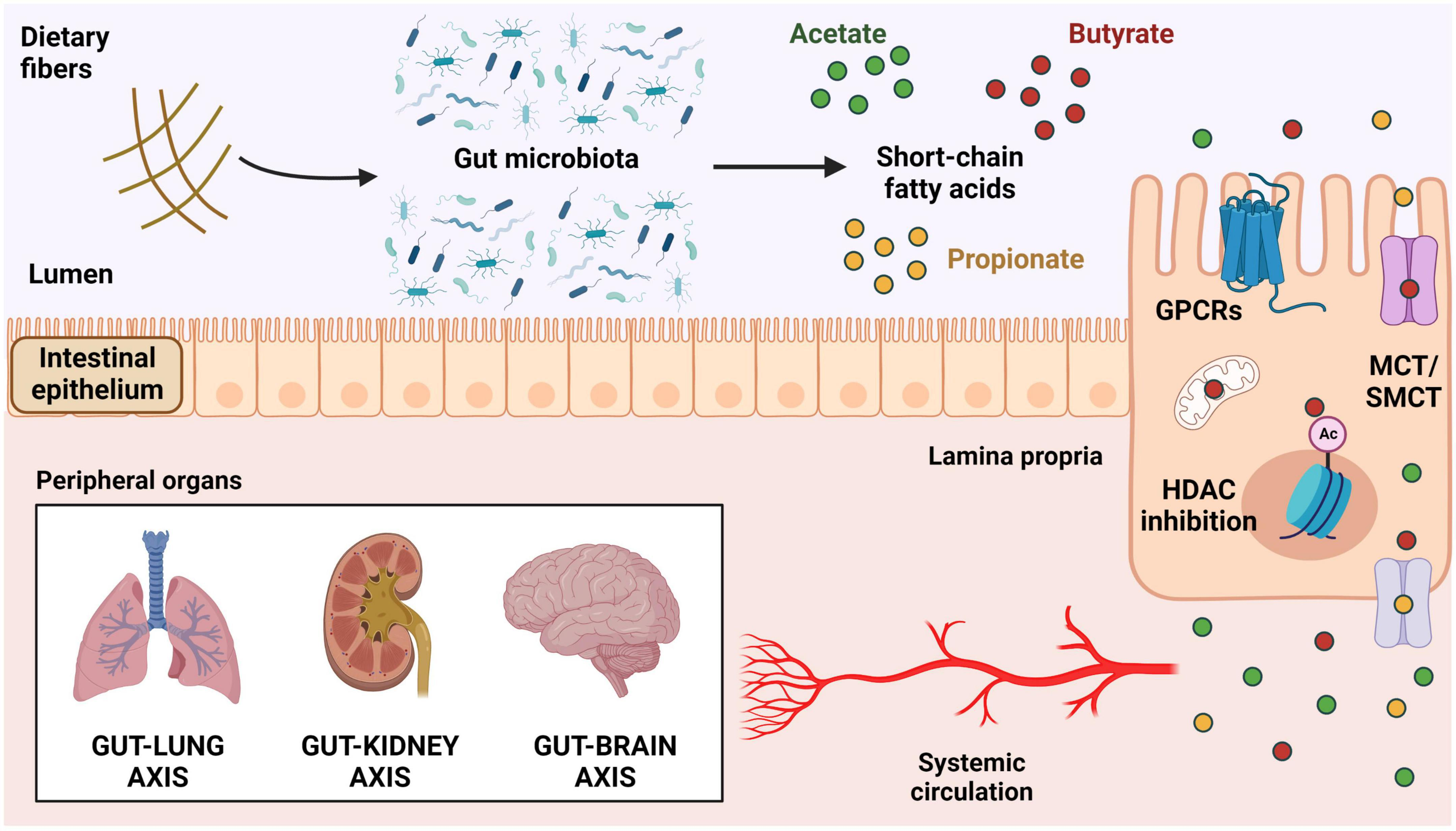User28823
do not go gentle into that good night
- Joined
- Aug 7, 2022
- Posts
- 27,550
- Reputation
- 47,765
What is Butyrate?
Butyrate is a short-chain fatty acid (SCFA) produced in your colon (large intestine) by gut bacteria fermenting dietary fibers. It is one of the three major SCFAs (others including acetate, propionate) and serves as:
How It's Produced Naturally
When you eat resistant starches and fibers, gut bacteria such as Faecalibacterium prausnitzii, Roseburia, and Eubacterium rectale ferment them. The byproduct? Butyrate.
High-butyrate-producing foods (via fiber fermentation)
Supplements come as sodium butyrate, calcium/magnesium butyrate, or tributyrin (a triglyceride form that survives digestion better).
Downsides of exogenous butyrate supplementation
Butyrate not only delays growth plate closure by downregulating expression of the estrogen receptor and thus slowing down ossification of the epiphyseal cartilage. It also directly promotes bone growth by enhancing expression of the IGF-1 receptor as well as IGF-1 synthesis. Butyrate also reduces activity of IGFBP-3, the binding protein which makes IGF-1 useless to bone.

In fact, children with significant growth deficiencies (height) don't just have low levels of growth hormone and IGF-1. They also have MUCH lower diversity in the gut microbiome. The SCFA content in the gut is 33% lower on average, with butyrate content being 54% lower.

Butyrate's effects on androgen sensitivity
Butyrate upregulates androgen receptor (AR) expression and can activate AR target genes even at baseline testosterone levels.
Now that you know how critical butyrate is, you should:
Sources
Peng L, Li Z-R, Green RS, Holzman IR, Lin J. Butyrate enhances the intestinal barrier by facilitating tight junction assembly via activation of AMP-activated protein kinase. Am J Physiol Gastrointest Liver Physiol. 2009;296(3):G A P. doi:10.1152/ajpgi.90546.2008. PMID: 19147802; PMCID: PMC2728689.
Salvi PS, Cowles RA. Butyrate and the intestinal epithelium: energy metabolism and beyond. Nutrients. 2021;13(8):2796. doi:10.3390/nu13082796. PMID: 34444142; PMCID: PMC8304699.
Litvak Y, Byndloss MX, Bäumler AJ. Colonocyte metabolism shapes the gut microbiota. Science. 2018;362(6418):eaat9076. doi:10.1126/science.aat9076. PMID: 30385462.
He P, Lyu Y, Shen X, Liu W, Zhang Y, Li Y, Huang Y, Xu L, Zhang L, Guo S. Gut microbiome and short-chain fatty acids associated with the efficacy of growth hormone treatment in children with short stature. Front Pediatr. 2025 Mar 31;13:1557878. doi: 10.3389/fped.2025.1557878. PMID: 40230807; PMCID: PMC11994682.
Kim J, Park H, Im JY, Choi WS, Kim HS. Sodium butyrate regulates androgen receptor expression and cell cycle arrest in human prostate cancer cells. Anticancer Res. 2007 Sep-Oct;27(5A):3285-92. PMID: 17970072.
Sadar MD, Gleave ME. Ligand-independent activation of the androgen receptor by the differentiation agent butyrate in human prostate cancer cells. Cancer Res. 2000 Oct 15;60(20):5825-31. PMID: 11059779.
Matsushita M, Fujita K, Motooka D, Hatano K, Hata J, Nishimoto M, Banno E, Takezawa K, Fukuhara S, Kiuchi H, Pan Y, Takao T, Tsujimura A, Yachida S, Nakamura S, Obara W, Uemura H, Nonomura N. Firmicutes in Gut Microbiota Correlate with Blood Testosterone Levels in Elderly Men. World J Mens Health. 2022 Jul;40(3):517-525. doi: 10.5534/wjmh.210190. Epub 2022 Feb 24. PMID: 35274505; PMCID: PMC9253793.
Qi, J., Sun, Y., Chen, Z. et al. Sodium butyrate promotes synthesis of testosterone and meiosis of hyperuricemic male mice. Sci Rep 15, 14757 (2025). https://doi.org/10.1038/s41598-025-95846-6
Butyrate is a short-chain fatty acid (SCFA) produced in your colon (large intestine) by gut bacteria fermenting dietary fibers. It is one of the three major SCFAs (others including acetate, propionate) and serves as:
- The main energy source for colonocytes, the cells lining the colon.
- A barrier-strengthener that keeps gut junctions tight
- An anti-inflammatory signaling molecule, influencing both the immune system and gene expression through HDAC inhibition
How It's Produced Naturally
When you eat resistant starches and fibers, gut bacteria such as Faecalibacterium prausnitzii, Roseburia, and Eubacterium rectale ferment them. The byproduct? Butyrate.
High-butyrate-producing foods (via fiber fermentation)
- Cooked and cooled potatoes, rice, or oats (resistant starch)
- Green bananas or plantains
- Legumes and beans
- Vegetables like asparagus, onions, leeks, garlic
- Whole grains
Supplements come as sodium butyrate, calcium/magnesium butyrate, or tributyrin (a triglyceride form that survives digestion better).
Downsides of exogenous butyrate supplementation
- When taken orally, much of it is absorbed in the upper gut, so less reaches the colon.
- Butyrate is a histone-deacetylase (HDAC) inhibitor - this affects gene expression epigenetically.
- At physiologic doses, that's beneficial: it suppresses pro-inflammatory genes.
- At excessive doses or chronic high exposure, HDAC inhibition can reactivate latent viruses (such as EBV, CMV, or HIV) because some viruses remain dormant via histone suppression, which HDAC inhibitors can reverse.
- You'll have lower butyrate production.
- Colonocytes get less fuel -> weakened gut lining and higher permeability ("leaky gut").
- Mucus layer may thin, promoting inflammation and letting pathogens or endotoxins cross into the bloodstream.
- Opportunistic bacteria (often proteolytic species that ferment protein instead of fiber) proliferate and produce toxic metabolites like ammonia and phenols instead of SCFAs.
Butyrate not only delays growth plate closure by downregulating expression of the estrogen receptor and thus slowing down ossification of the epiphyseal cartilage. It also directly promotes bone growth by enhancing expression of the IGF-1 receptor as well as IGF-1 synthesis. Butyrate also reduces activity of IGFBP-3, the binding protein which makes IGF-1 useless to bone.

In fact, children with significant growth deficiencies (height) don't just have low levels of growth hormone and IGF-1. They also have MUCH lower diversity in the gut microbiome. The SCFA content in the gut is 33% lower on average, with butyrate content being 54% lower.

Butyrate's effects on androgen sensitivity
Butyrate upregulates androgen receptor (AR) expression and can activate AR target genes even at baseline testosterone levels.
- Men with higher levels of Firmicutes (butyrate producers) have significantly higher testosterone levels.
- Sodium butyrate in mice activated the LH/cAMP/PKA pathway in Leydig cells, boosting testosterone, sperm count, and motility.
- Gut bacteria deconjugate and recycle androgens, increasing free testosterone and DHT availability.
Now that you know how critical butyrate is, you should:
- Feed your butyrate producers
- Eat diverse soluble fibers and resistant starches. Introducing gradually to avoid bloating. If you've eaten a low-fiber diet for years, your gut bacteria that specialize in fermenting fibers (like Roseburia or Faecalibacterium prausnitzii) have dwindled. Suddenly eating high fiber foods gives other microbes first access - they ferment it inefficiently, producing hydrogen, CO2, and methane. But if you introduce fiber gradually, those gas-producing microbes shift toward SCFA-producing species - and gas decreases dramatically.
- Avoid excessive exogenous butyrate unless guided therapeutically.
- Support microbial diversity by rotating fiber types (inulin, pectin, beta-glucans), including fermented foods in your diet (sauerkraut, kefir), and limit antibiotics unless necessary.
- Pair fibers with prebiotic polyphenols (from berries or green tea) which nourish beneficial bacteria.
Sources
Peng L, Li Z-R, Green RS, Holzman IR, Lin J. Butyrate enhances the intestinal barrier by facilitating tight junction assembly via activation of AMP-activated protein kinase. Am J Physiol Gastrointest Liver Physiol. 2009;296(3):G A P. doi:10.1152/ajpgi.90546.2008. PMID: 19147802; PMCID: PMC2728689.
Salvi PS, Cowles RA. Butyrate and the intestinal epithelium: energy metabolism and beyond. Nutrients. 2021;13(8):2796. doi:10.3390/nu13082796. PMID: 34444142; PMCID: PMC8304699.
Litvak Y, Byndloss MX, Bäumler AJ. Colonocyte metabolism shapes the gut microbiota. Science. 2018;362(6418):eaat9076. doi:10.1126/science.aat9076. PMID: 30385462.
He P, Lyu Y, Shen X, Liu W, Zhang Y, Li Y, Huang Y, Xu L, Zhang L, Guo S. Gut microbiome and short-chain fatty acids associated with the efficacy of growth hormone treatment in children with short stature. Front Pediatr. 2025 Mar 31;13:1557878. doi: 10.3389/fped.2025.1557878. PMID: 40230807; PMCID: PMC11994682.
Kim J, Park H, Im JY, Choi WS, Kim HS. Sodium butyrate regulates androgen receptor expression and cell cycle arrest in human prostate cancer cells. Anticancer Res. 2007 Sep-Oct;27(5A):3285-92. PMID: 17970072.
Sadar MD, Gleave ME. Ligand-independent activation of the androgen receptor by the differentiation agent butyrate in human prostate cancer cells. Cancer Res. 2000 Oct 15;60(20):5825-31. PMID: 11059779.
Matsushita M, Fujita K, Motooka D, Hatano K, Hata J, Nishimoto M, Banno E, Takezawa K, Fukuhara S, Kiuchi H, Pan Y, Takao T, Tsujimura A, Yachida S, Nakamura S, Obara W, Uemura H, Nonomura N. Firmicutes in Gut Microbiota Correlate with Blood Testosterone Levels in Elderly Men. World J Mens Health. 2022 Jul;40(3):517-525. doi: 10.5534/wjmh.210190. Epub 2022 Feb 24. PMID: 35274505; PMCID: PMC9253793.
Qi, J., Sun, Y., Chen, Z. et al. Sodium butyrate promotes synthesis of testosterone and meiosis of hyperuricemic male mice. Sci Rep 15, 14757 (2025). https://doi.org/10.1038/s41598-025-95846-6




